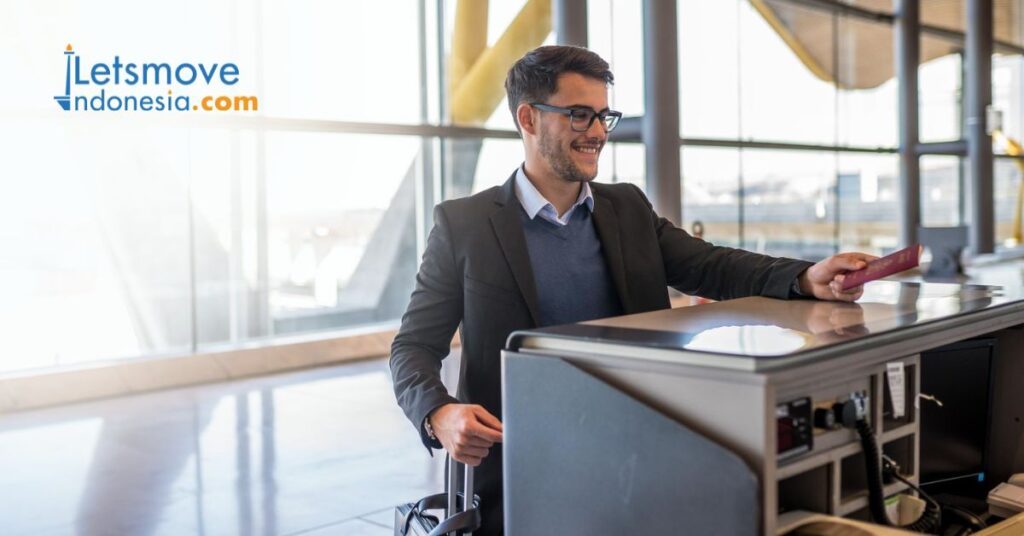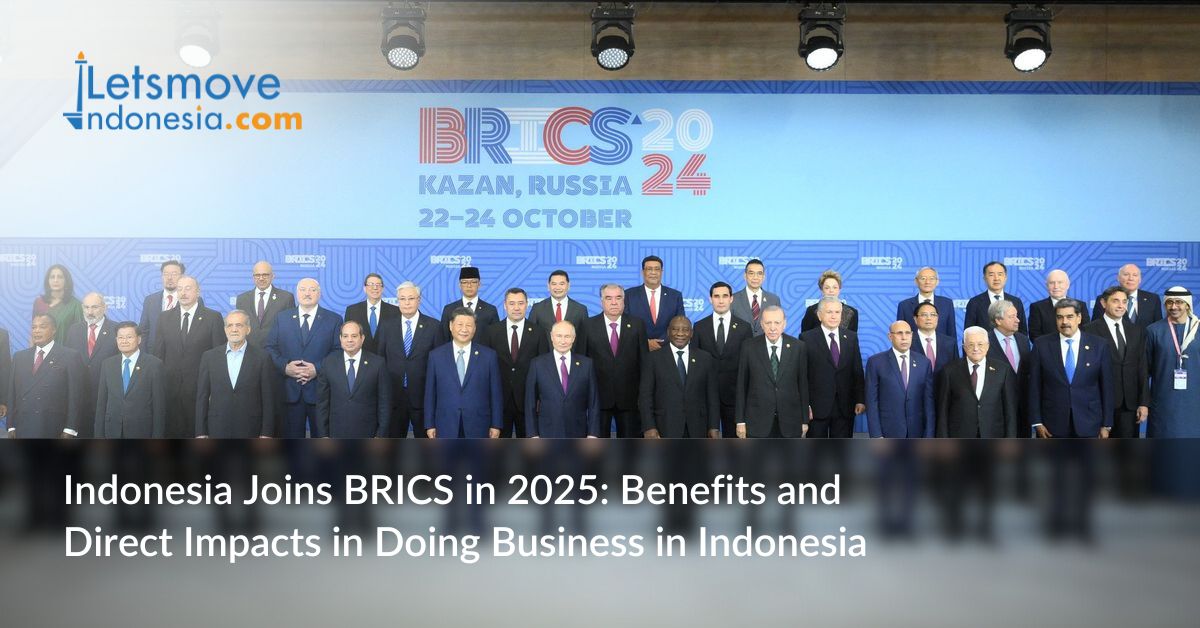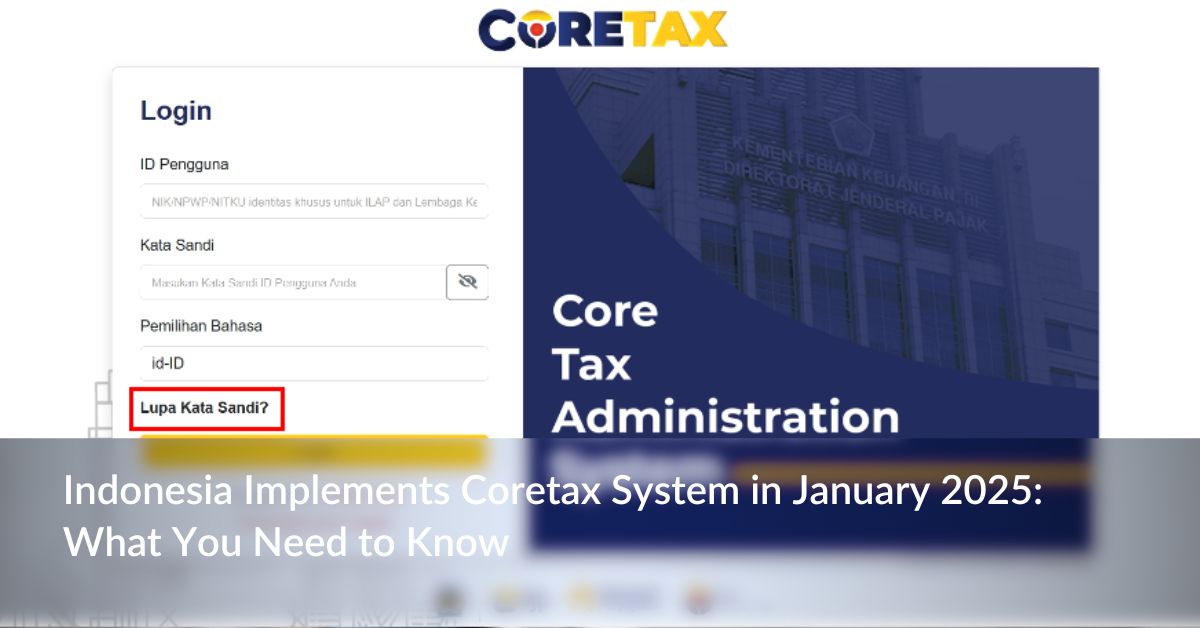- Home
- Legal Services
- Halal License
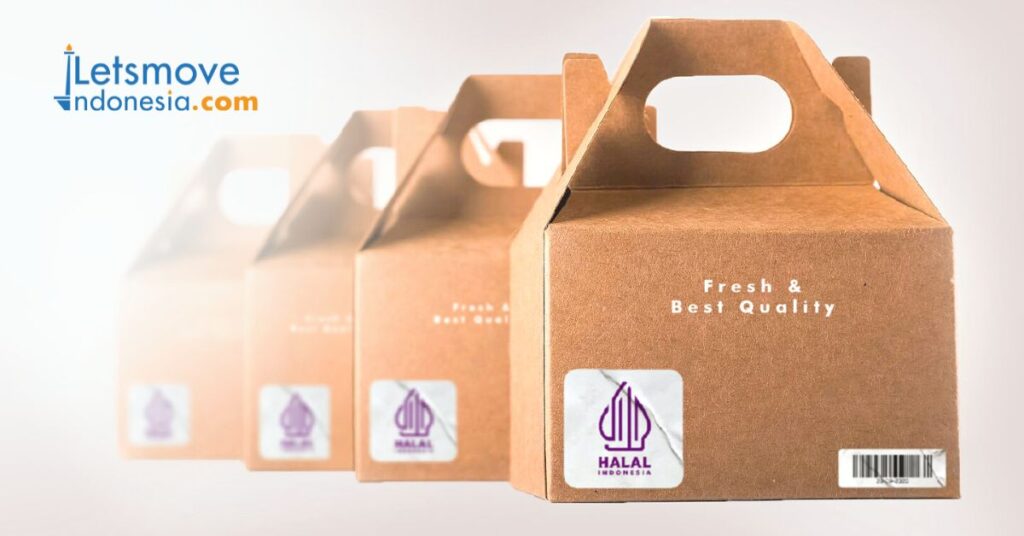
Halal Certification & Food License - Lets Move Indonesia
Company Registration & Legal Services
- Share:
Halal License – Who is it for and what are the benefits
Approximately 88% of the people living in Indonesia are Muslim. This implies that the country places first regarding the highest proportion of Muslim individuals across the globe. Therefore, investors seeking to enter this country’s market should pay special concern to obtaining halal certification.
If you are planning to sell food products and edible products in Indonesia, Halal certification is one of the essential licenses you should never miss to obtain consumer trust.
Halal food is addressed to all products and services that have proven not to contain prohibited materials, ingredients, or unlawful methods according to Sharia Law.
Halal certification in Indonesia caters to a declaration to prove that the products ingredients comply with Islamic law and serve as the justification for Muslim citizens if certain products or services are permissible to consume or use. The food must undergo a pharmaceutical audit to ensure it meets halal standards and is free from additives.
The process of issuing a Halal Certification will take approximately 21 days and a lot of required steps to do. Therefore, acquiring your Halal Certificate with Lets Move Indonesia ensures you save time and hassle while still having your certificate issued on time.
Frequently Asked Questions
What are the commodities that require Halal certification?
The commodities are mostly consumable goods, such as foods, beverages and in some cases cosmetics.
How long a Halal certification is valid and can it be renewed?
Halal Certificate has no validity, as long as the product does not change ingredients, and it already has halal certification, then it can exist indefinitely.
Should I issue Halal Certifications to distribute and sell foreign products in Indonesia?
Should I issue Halal Certifications to distribute and sell foreign products in Indonesia?
What is the name of the institution/body that issues the halal compliance?
In Indonesia, the institution responsible for certifying Halal compliance is the Badan Penyelenggara Jaminan Produk Halal (BPJPH), or the Halal Product Assurance Organizing Agency.
The BPJPH is a government body under the Ministry of Religious Affairs that oversees and regulates the Halal certification process in Indonesia.
They work in conjunction with the Lembaga Pemeriksa Halal (LPH), or Halal Inspection Agencies, which conduct the actual inspections and audits of products and processes to ensure compliance with Halal standards.
Finally, the Majelis Ulama Indonesia (MUI), or the Indonesian Council of Ulema, plays a crucial role in issuing Halal fatwas or religious opinions on the Halal status of products based on the findings of the LPH.
Therefore, while the BPJPH issues the final Halal certificate, it relies on the collaboration with LPH and MUI to ensure the integrity and credibility of the certification process.
Given that Indonesia is the world's largest halal market, how has the issuance of halal certification in Jakarta specifically impacted various sectors in the Republic of Indonesia?
The issuance of halal certification in Jakarta has had a profound impact on various sectors across Indonesia, particularly in the food and beverage, cosmetics, and pharmaceutical industries. It has boosted consumer confidence, increased market access for businesses, and solidified Indonesia’s position as a global halal hub.
Does small business need Halal Certification?
Depends on your business needs. Essentially, Halal certification will be needed when your product enters the retail market.
How long does Indonesia's Halal Certification process take time?
The time it takes to get Halal certification can vary widely. Factors like how complex your business is, how prepared your paperwork is, and which certification body you choose all play a role. Simple businesses with everything ready can get certified faster, while bigger companies with more complex processes might take longer.
Generally, you can expect the process to include an application review (a few weeks), an on-site audit (a few days to weeks), and then the final decision and certification (a few more weeks). In total, this can take anywhere from a few weeks to several months. Being prepared, choosing the right certification body, and being quick to fix any issues can help speed things up.
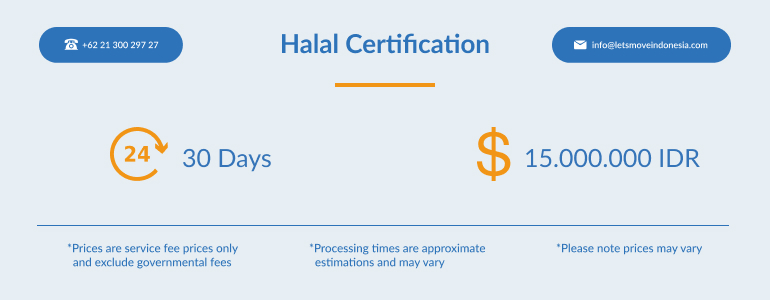
Steps to get your Halal Licenses with Lets Move Indonesia
- Consult with our legal consultant and prepare all the required documents
- Our consultant will assist you in preparing all the documents needed and make sure no missing data
- Submitting a Halal Application through OSS
- Submit the Halal License application through OSS
- Document Verification
- The Government will check and verify the document submission
- Checking and Testing the Products
- Submitting products for a laboratory check and making sure the product complies with halal standardisations.
- Set the Halal Verdict
- Publishing the Halal Certificate
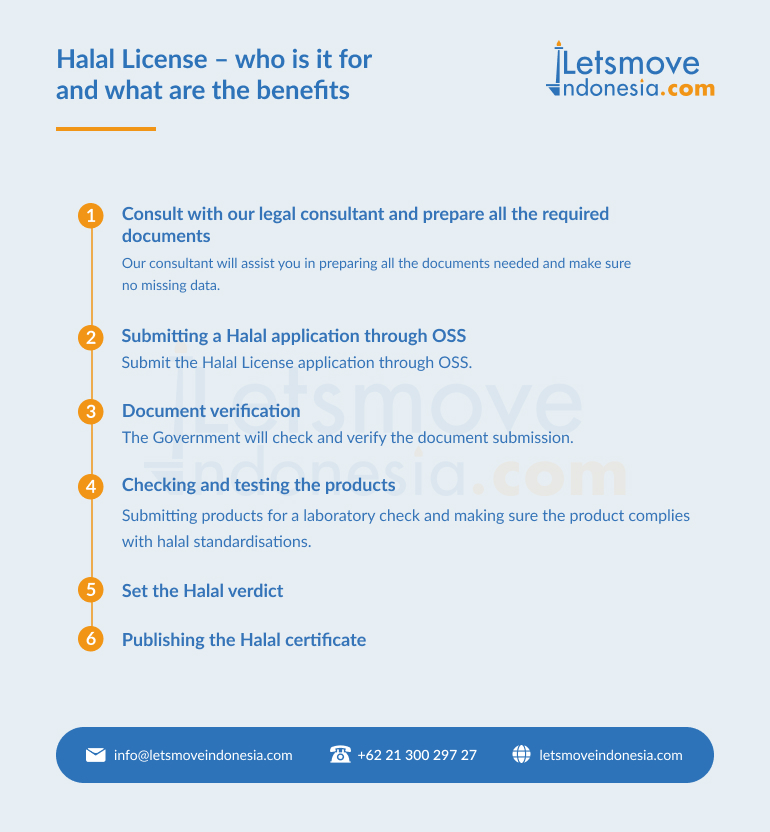
Requirements
To apply for a Halal Certificate, an applicant should provide these requirements:
- Personal data: NIB, if you do not have NIB, it can be proven by other licences (NPWP, SIUP, IUMK, IUI, etc.
- Name and type of product
- List of products and raw materials
- Product processing process documentation
- Halal Product Assurance system document
- Share :
Popular Services
Interesting News

Contact Us
Speak to Our Team Now to Get Your Free Consultation!

More of Our Popular Indonesia Legal Services
Stay informed with the latest Indonesia Visa & Business updates.

Latest News
Get to Know Latest Business & Visa Updates
Bali has become a top choice for foreigners to invest in real estate. But research on the property market can be tricky if you are unaware of the local laws and regulations. The good news is that buy a property in Bali is actually a possibility for foreign investors, yet there are regulations and rules on […]
Lets Move Indonesia
03/25/2025
Indonesia property market in 2025 is presenting a golden chance to investors. Rapidly growing economy, urbanization, and favorable government policies, now it is the right time to enter into this market. Let’s discover more about it. Current Trends in the Indonesia Property Market The Indonesian economic growth train on track with an annual increase rate […]
Lets Move Indonesia
03/25/2025
The Ministry of Finance (MoF) on October 18, 2024 introduced Regulation No. 81 (MoF-81) to streamline and develop different tax regulations. This was done in order to ensure that the new CoreTax Administration System (CoreTax) would be effective from 1 January 2025. This is a major reform effort that seeks to improve the effectiveness, reliability […]
Lets Move Indonesia
01/30/2025
17th of January, 2025 – Aligning with the regulation change in Indonesia regarding adjustments to the Penerimaan Negara Bukan Pajak (PNBP), or Non-Tax State Revenue in 2024, Lets Move Indonesia as the Indonesia announces a revised pricing structure for our comprehensive services. This adjustment isn’t simply a response to regulatory changes, it reflects a reaffirmation […]
Lets Move Indonesia
01/17/2025
Indonesia welcomed the inauguration of its membership in BRICS organisation after being announced by the 2025 Chair of BRICS, Brazil on Monday, (6/1/2025). Through the official statement, the Ministry of Foreign Affairs confirmed that the membership in BRICS represents a strategic step to strengthen democratic collaboration with other developing countries under the framework of inclusivity, […]
Lets Move Indonesia
01/12/2025
Indonesia’s tax system continues to play a pivotal role in supporting national development and achieving fiscal sustainability. However, enhancing tax revenue remains a significant challenge for the government, as annual targets consistently rise amidst various obstacles. As of 31 October 2024, Indonesia tax revenue reached IDR 1,517.5 trillion, approximately 76.3% of the State Budget (APBN) […]
Lets Move Indonesia
01/02/2025
